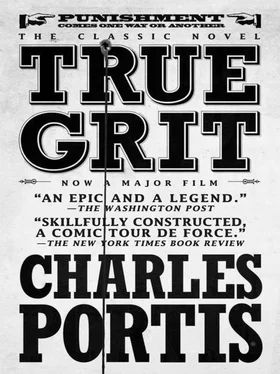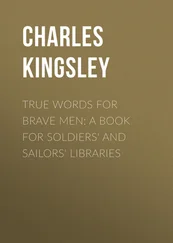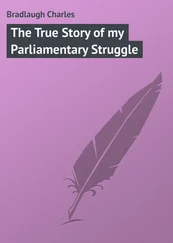Charles Portis - True Grit
Здесь есть возможность читать онлайн «Charles Portis - True Grit» весь текст электронной книги совершенно бесплатно (целиком полную версию без сокращений). В некоторых случаях можно слушать аудио, скачать через торрент в формате fb2 и присутствует краткое содержание. Год выпуска: 2011, Жанр: Старинная литература, на английском языке. Описание произведения, (предисловие) а так же отзывы посетителей доступны на портале библиотеки ЛибКат.
- Название:True Grit
- Автор:
- Жанр:
- Год:2011
- ISBN:нет данных
- Рейтинг книги:3 / 5. Голосов: 1
-
Избранное:Добавить в избранное
- Отзывы:
-
Ваша оценка:
- 60
- 1
- 2
- 3
- 4
- 5
True Grit: краткое содержание, описание и аннотация
Предлагаем к чтению аннотацию, описание, краткое содержание или предисловие (зависит от того, что написал сам автор книги «True Grit»). Если вы не нашли необходимую информацию о книге — напишите в комментариях, мы постараемся отыскать её.
True Grit — читать онлайн бесплатно полную книгу (весь текст) целиком
Ниже представлен текст книги, разбитый по страницам. Система сохранения места последней прочитанной страницы, позволяет с удобством читать онлайн бесплатно книгу «True Grit», без необходимости каждый раз заново искать на чём Вы остановились. Поставьте закладку, и сможете в любой момент перейти на страницу, на которой закончили чтение.
Интервал:
Закладка:
The railroad agent was an older man named Smallwood. He praised us for our pluck and he was very much pleased to see the sacks of cash and valuables we had recovered. You may think Rooster was hard in appropriating the traps of the dead men but I will tell you that he did not touch one cent of the money that was stolen at gunpoint from the passengers of the Katy Flyer. Smallwood looked over the “booty” and said it would certainly help to cover the loss, though it was his experience that some of the victims would make exaggerated claims.
He had known the martyred clerk personally and he said the man had been a loyal employee of the M. K. & T. for some years. In his youth the clerk had been a well-known foot racer in Kansas. He showed his spunk right to the end. Smallwood did not know the fireman personally. In both cases, said he, the M. K. & T. would try to do something for the bereaved families, though times were hard and revenue down. They say Jay Gould had no heart! Smallwood also assured Rooster that the railroad would do right by him, providing he “clean up” Lucky Ned Pepper’s robber band and recover the stolen express funds.
I advised Rooster to get a written statement from Smallwood to that effect, along with an itemized, timed and dated receipt for the two sacks of “booty.” Smallwood was wary about committing his company too far but we got a receipt out of him and a statement saying that Rooster had produced on that day the lifeless bodies of two men “whom he alleges took part in said robbery.” I think Smallwood was a gentleman but gentlemen are only human and their memories can sometimes fail them. Business is business.
Mr. McAlester, who kept the store, was a good Arkansas man. He too commended us for our actions and he gave us towels and pans of hot water and some sweet-smelling olive soap. His wife served us a good country dinner with fresh buttermilk. LaBoeuf joined us for the hearty meal. The medical-trained Indian had been able to remove all the big splinters and lead fragments and he had bound the arm tightly. Naturally the limb remained stiff and sore, yet the Texan enjoyed a limited use of it.
When we had eaten our fill, Mr. McAlester’s wife asked me if I did not wish to lie down on her bed for a nap. I was sorely tempted but I saw through the scheme. I had noticed Rooster talking to her on the sly at the table. I concluded he was trying to get shed of me once again. “Thank you, mam, I am not tired,” said I. It was the biggest story I have ever told!
We did not leave right away because Rooster found that his horse Bo had dropped a front shoe. We went to a little shed kept by a blacksmith. While waiting there, LaBoeuf repaired the broken stock of his Sharps rifle by wrapping copper wire around it. Rooster hurried the smith along with the shoeing, as he was not disposed to linger in the settlement. He wished to stay ahead of the posse of marshals that he knew was even then scouring the brush for Lucky Ned Pepper and his band.
He said to me, “Sis, the time has come when I must move fast. It is a hard day’s ride to where I am going. You will wait here and Mrs. McAlester will see to your comfort. I will be back tomorrow or the next day with our man.”
“No, I am going along,” said I.
LaBoeuf said, “She has come this far.”
Rooster said, “It is far enough.”
I said, “Do you think I am ready to quit when we are so close?”
LaBoeuf said, “There is something in what she says, Cogburn. I think she has done fine myself. She has won her spurs, so to speak. That is just my personal opinion.”
Rooster held up his hand and said, “All right, let it go. I have said my piece. We won’t have a lot of talk about winning spurs.”
We departed the place around noon, traveling east and slightly south. Rooster called the turn when he said “hard riding.” That big long-legged Bo just walked away from the two ponies, but the weight began to tell on him after a few miles and Little Blackie and the shaggy pony closed the distance on him ere long. We rode like the very “dickens” for about forty minutes and then stopped and dismounted and walked for a spell, giving the horses a rest. It was while we were walking that a rider came up hallooing and overtook us. We were out on a prairie and we saw him coming for some little distance.
It was Captain Finch, and he brought exciting news. He told us that shortly after we had left McAlester’s, he received word that Odus Wharton had broken from the basement jail in Fort Smith. The escape had taken place early that morning.
Here is what happened. Not long after breakfast two trusty prisoners brought in a barrel of clean sawdust for use in the spittoons of that foul dungeon. It was fairly dark down there and in a moment when the guards were not looking the trusties concealed Wharton and another doomed murderer inside the barrel. Both men were of slight stature and inconsiderable weight. The trusties then carried the two outside and away to freedom. A bold daylight escape in a fat barrel! Some clever “stunt”! The trusties ran off along with the convicted killers and very likely drew good wages for their audacity.
On hearing the news Rooster did not appear angry or in any way perturbed, but only amused. You may wonder why. He had his reasons and among them were these, that Wharton now stood no chance of winning a commutation from President R. B. Hayes, and also that the escape would cause Lawyer Goudy a certain amount of chagrin in Washington city and would no doubt result in a big expense loss for him, as clients who resolve their own problems are apt to be slow in paying due bills from a lawyer.
Captain Finch said, “I thought you had better know about this.”
Rooster said, “I appreciate it, Boots. I appreciate you riding out here.”
“Wharton will be looking for you.”
“If he is not careful he will find me.”
Captain Finch looked LaBoeuf over, then said to Rooster, “Is this the man who shot Ned’s horse from under him?”
Rooster said, “Yes, this is the famous horse killer from El Paso, Texas. His idea is to put everybody on foot. He says it will limit their mischief.”
LaBoeuf’s fair-complected face became congested with angry blood. He said, “There was very little light and I was firing off-hand. I did not have the time to find a rest.”
Captain Finch said, “There is no need to apologize for that shot. A good many more people have missed Ned than have hit him.”
“I was not apologizing,” said LaBoeuf. “I was only explaining the circumstances.”
“Rooster here has missed Ned a few times himself, horse and all,” said the captain. “I reckon he is on his way now to missing him again.”
Rooster was holding a bottle with a little whiskey in it. He said, “You keep on thinking that.” He drained off the whiskey in about three swallows and tapped the cork back in and tossed the bottle up in the air. He pulled his revolver and fired at it twice and missed. The bottle fell and rolled and Rooster shot at it two or three more times and broke it on the ground. He got out his sack of cartridges and reloaded the pistol. He said, “The Chinaman is running them cheap shells in on me again.”
LaBoeuf said, “I thought maybe the sun was in your eyes. That is to say, your eye.”
Rooster swung the cylinder back in his revolver and said, “Eyes, is it? I’ll show you eyes!” He jerked the sack of corn dodgers free from his saddle baggage. He got one of the dodgers out and flung it in the air and fired at it and missed. Then he flung another one up and he hit it. The corn dodger exploded. He was pleased with himself and he got a fresh bottle of whiskey from his baggage and treated himself to a drink.
LaBoeuf pulled one of his revolvers and got two dodgers out of the sack and tossed them both up. He fired very rapidly but he only hit one. Captain Finch tried it with two and missed both of them. Then he tried with one and made a successful shot. Rooster shot at two and hit one. They drank whiskey and used up about sixty corn dodgers like that. None of them ever hit two at one throw with a revolver but Captain Finch finally did it with his Winchester repeating rifle, with somebody else throwing. It was entertaining for a while but there was nothing educational about it. I grew more and more impatient with them.
Читать дальшеИнтервал:
Закладка:
Похожие книги на «True Grit»
Представляем Вашему вниманию похожие книги на «True Grit» списком для выбора. Мы отобрали схожую по названию и смыслу литературу в надежде предоставить читателям больше вариантов отыскать новые, интересные, ещё непрочитанные произведения.
Обсуждение, отзывы о книге «True Grit» и просто собственные мнения читателей. Оставьте ваши комментарии, напишите, что Вы думаете о произведении, его смысле или главных героях. Укажите что конкретно понравилось, а что нет, и почему Вы так считаете.












